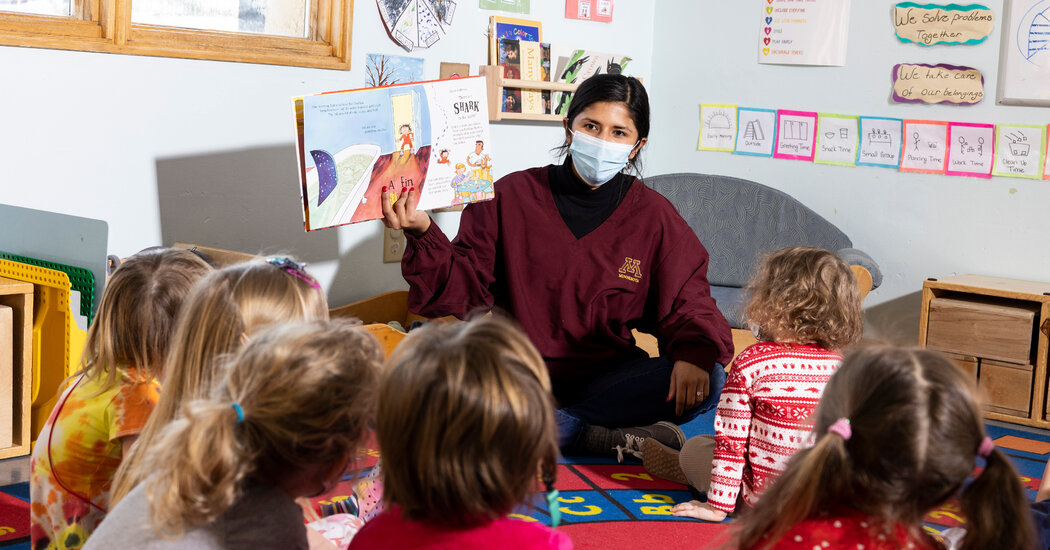Advertisement
Federal action to make children older than 6 months eligible for vaccines not only affects parents but also day care centers, which have struggled throughout the pandemic.
Send any friend a story
As a subscriber, you have 10 gift articles to give each month. Anyone can read what you share.
This article is part of our Daily Covid Briefing
Adeel Hassan and
It is finally their turn. American children ages 6 months through 4 years recently became eligible to receive coronavirus vaccinations, after federal regulators and health officials cleared vaccines from Moderna and Pfizer-BioNTech for very young children.
The immediate impact, though, will be blunted by weakened demand by parents, many experts have forecast, and the patchwork policies of day care facilities and early childhood centers, where few policies, if any, are expected to change in the near future.
“If the authorization had come in December, it would have been much more of a game changer,” said Rupali Limaye, the deputy director of the International Vaccine Access Center at the Johns Hopkins Bloomberg School of Public Health.
Dr. Limaye, who studies vaccine demand and vaccine hesitancy, said that the demand for the Pfizer-BioNTech vaccine for children ages 5 to 11 late last year was driven in part by fears at the start of the Omicron surge. Still, less than one-third of those ages 5 to 11 have been inoculated since they became eligible in November.
The uptake for the newly eligible group would likely be even less, Dr. Limaye said, because the perception in the United States is significantly different now, with much of the American public acting as if the pandemic is over.
A recent Kaiser Family Foundation survey found that only about one in five parents of children younger than 5 were eager to get their children vaccinated right away. Thirty-eight percent of parents surveyed said they would “wait and see.”
“We expect there to be an initial rush, where 20 percent of parents will get vaccinated in the next couple of weeks,” said Nikki Garro, the director of early childhood health programs at Child Care Aware, a national child care advocacy organization. “Then it will be a slow trickle.”
It is unlikely that day care providers or early childhood centers would mandate coronavirus vaccinations, she said, as only seven states require flu shots for child care and pre-K programs. But every state requires the measles, mumps and rubella inoculation before child care enrollment.
“We want to be sure to support programs because parents may have questions and also ensure that the adults too, who have not received their booster shot, still recognize that is an important part of reducing the spread,” Ms. Garro said. “Also, children under 6 months who are in child care will still not have access to vaccines, so we need to protect the youngest children.”
The American Academy of Pediatrics and other health care experts strongly recommend that all children ages 6 months and older get vaccinated. The Centers for Disease Control and Prevention recently noted as well that “All children, including children who have already had Covid-19, should get vaccinated.”
“For kids who are vaccinated, these vaccines will make it even less likely that they will get severe illness, but they will also make it less likely for them to be infected in the first place and to pass on the virus to other kids and to adults who might be susceptible to more severe illness,” said Crystal Watson, a senior scholar at the Johns Hopkins Center for Health Security at the Bloomberg School of Public Health.
Another challenge is the patchwork of guidelines from county and state governments, with their array of isolation and quarantine requirements for infected children and their close contacts. Child care centers vary widely in their protocols, Dr. Watson said, and many would not make changes unless there were updated guidance from the Centers for Disease Control and Prevention, or state and local health departments.
“The regulations are inconsistent and their interpretation is inconsistent,” said Gigi Schweikert, the chief executive of Lightbridge Academy, which operates 120 early childhood care centers across the country. Lightbridge does not plan to require children be vaccinated unless state or local health departments do.
“What we’re hoping will happen is that if children are vaccinated and asymptomatic and have been in an exposure situation, they will not be asked to quarantine,” she said.
Many are hoping for a more significant impact from the new authorizations. Kristie Skoglund, the chief executive of the Florida Center for Early Childhood, which provides care and therapy for young children with developmental delays, disabilities and mental health challenges, said that the vaccines will help organizations like hers by providing another preventive tool that “may help the transition back to prepandemic policies and procedures.”
Jesus Jiménez, Amanda Holpuch, Alexandra E. Petri, and Carly Olson contributed reporting.
Advertisement
Discover The 'Can't-Fail' CPA Offers With Just 1- Click
